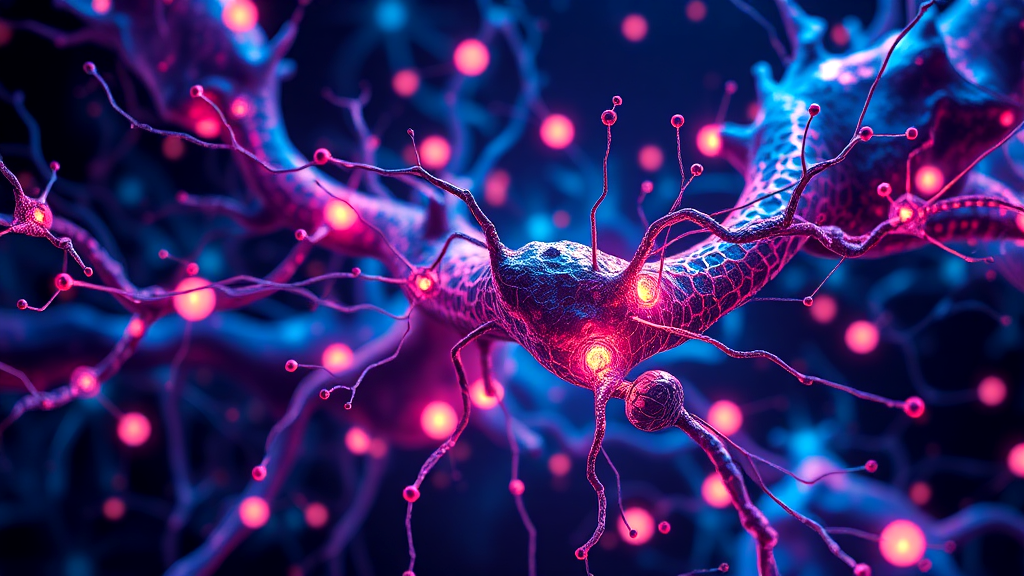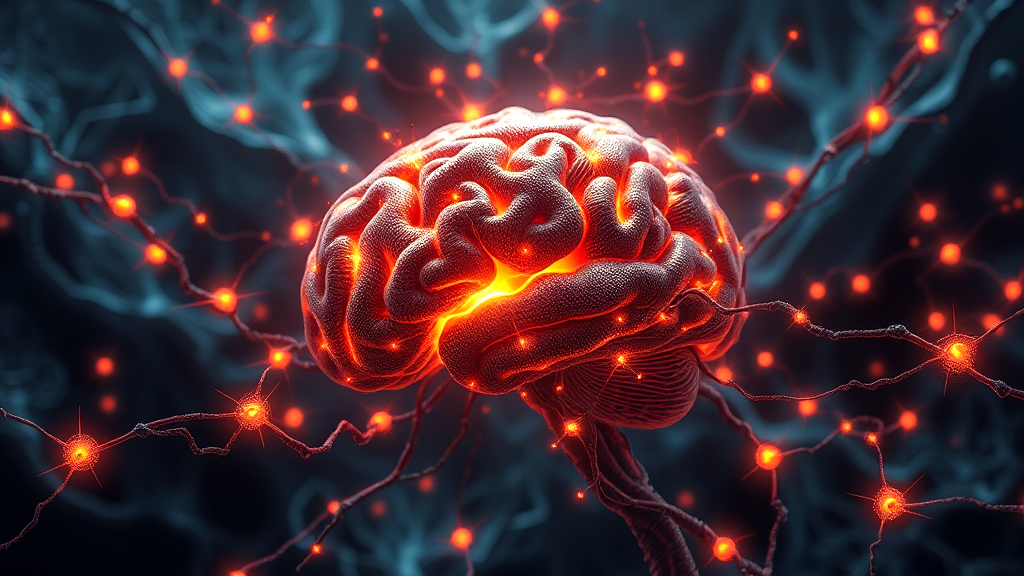
Hypothalamus: Key Functions Explained

Functions of the Hypothalamus
Exploring the hypothalamus's functions reveals its pivotal role in our body's operations. This small brain region orchestrates countless tasks, ensuring our internal environment remains stable. The anterior region, for instance, impacts hormone interactions, notably influencing the pituitary gland. Meanwhile, the middle region takes charge of balancing appetite and growth hormone release. Shifting focus to the posterior, it helps regulate temperature and memory. Without these functions, hypothalamus dysfunction could lead to serious issues. Intriguingly, the hypothalamus makes essential hormones, highlighting its importance. In the grand scheme, the hypothalamus sends crucial information throughout the body. Awareness of potential hypothalamus disorders is key, given their impact on physical well-being. This comprehensive hypothalamus overview underscores its intricate nature within our biological systems.
Anterior Region Roles
The roles of the anterior region in the hypothalamus are quite fascinating. It houses critical nuclei, including the supraoptic and paraventricular, which play key parts in hormone secretion. This region is a major player in the body's clockwork, helping maintain circadian rhythms and affecting how we interact with the world around us. Its influence extends to the pituitary gland, impacting numerous processes.
What happens if things go awry? Hypothalamus disorders may emerge, leading to significant challenges. Imagine the ripple effects on growth hormone regulation and other bodily functions. In the grand scheme, the brain's anterior region isn't just a bystander but a conductor, orchestrating the body's symphony. This delicate balance ensures we respond aptly to our environment.
Middle Region Roles
In exploring the roles of the tuberal region, we find its involvement in appetite regulation and the release of growth hormone. This area of the hypothalamus is instrumental in managing hunger, ensuring our energy levels are balanced. It's like a culinary maestro, orchestrating when we feel the urge to snack or skip that second helping.
When this harmony is disrupted, it can lead to hypothalamus dysfunction, impacting both body and mind. Imagine a day where you just can't get the hunger cues right—it'd be chaos! The connection with the pituitary gland further emphasizes its complex functions, weaving a tapestry of hormonal interactions. As this network functions, the brain’s anterior region continues to play its part, ensuring hormonal balance is maintained.
Posterior Region Roles
The posterior hypothalamic region plays a pivotal role beyond just temperature regulation. This area includes the mammillary nuclei, intricately involved in memory processing. Ever had one of those moments when a smell takes you back to childhood? That’s your brain at play! Meanwhile, the posterior hypothalamus keeps our internal thermostats in check, ensuring we don't overheat or freeze. Disruptions here can lead to hypothalamus dysfunction, affecting how we react to temperature changes.
Hormones from this region also interact with the pituitary gland, influencing the anterior pituitary's function. This cooperation ensures the right signals reach throughout the body. It's like a finely tuned orchestra where every section knows its cue, maintaining harmony in our bodily systems.
Interaction with the Pituitary Gland
Engaging with the pituitary gland involves a dynamic relationship between the hypothalamus and this pivotal endocrine component. The anterior pituitary, tasked with hormone release, gets its marching orders from the hypothalamus. This is where growth hormone, among others, enters the picture, orchestrating growth and metabolism. Meanwhile, the brain's anterior region steps up, ensuring that hormone levels stay balanced.
Not to be left behind, the posterior pituitary acts as a reservoir, releasing hormones like vasopressin and oxytocin at the right moment. Imagine it as a well-timed symphony, each hormone playing its part to maintain balance. For those curious about how these interactions affect daily rhythms, the National Institute of General Medical Sciences provides fascinating insights here.
Anterior and Posterior Pituitary
Navigating through the pituitary's anterior and posterior sections reveals a fascinating interplay with the hypothalamus. The anterior pituitary acts like a diligent mailman, delivering crucial hormones for growth, stress response, and reproduction. Meanwhile, the posterior section takes a backseat, storing and releasing oxytocin and vasopressin, essential for childbirth and hydration.
Interestingly, the brain's maestro, the hypothalamus, orchestrates this dynamic duo, ensuring each part receives the right cues. The pituitary gland, in its entirety, responds to these signals, maintaining bodily balance. It's as if the hypothalamus speaks the universal language of hormones, directing this endocrine symphony. While the hypothalamus makes hormones, the pituitary ensures their timely release. This interaction exemplifies the body's smart control center, seamlessly integrating and managing various systems without missing a beat.
Hormones Produced by the Hypothalamus
Discussing the pivotal role of the hypothalamus in hormone regulation reveals its extensive influence on the brain. This dynamic region produces critical hormones, such as thyrotropin-releasing hormone (TRH), corticotropin-releasing hormone (CRH), gonadotropin-releasing hormone (GnRH), and somatostatin. These biochemical messengers signal the anterior pituitary to regulate various bodily functions. From overseeing metabolism to orchestrating reproductive processes, these hormones are indispensable. The anterior pituitary, acting on these cues, ensures the body's equilibrium is maintained.
Curiously, researchers at Bioscientifica delve into this intricate communication network, highlighting its complexity. This interplay illustrates a finely tuned symphony, where each hormone contributes to a harmonious balance. Consequently, the hypothalamus emerges as a maestro, adeptly managing bodily rhythms and ensuring our continued well-being.

Common Hypothalamus Disorders
Hypothalamic issues, often linked to genetic anomalies or injuries, can manifest in various forms. For instance, hypothalamic obesity results from disrupted appetite regulation, leading to uncontrollable weight gain. Individuals may face immense challenges managing their weight, despite efforts to control diet and exercise. Meanwhile, Prader-Willi syndrome presents another dimension, where the hypothalamus fails to signal satiety. Patients constantly feel hungry, often resulting in obesity and related complications. Disturbances in circadian rhythms are also common, affecting sleep and mood. These disorders impact overall quality of life, necessitating comprehensive management strategies. The brain’s delicate balance is disrupted, echoing chaos in the body's internal harmony. Early diagnosis and intervention are crucial, offering hope for mitigation and improved outcomes.
Symptoms and Causes of Dysfunction
Exploring the symptoms and origins of hypothalamic issues, these often manifest as altered appetite, body temperature irregularities, and hormonal imbalances. The roots of these dysfunctions can be varied, encompassing genetic anomalies, traumatic injuries, and infections. Picture the hypothalamus as a malfunctioning thermostat; suddenly, your body's temperature and hunger cues are out of whack. Imagine feeling constantly hungry, unable to find satisfaction, or experiencing inexplicable weight gain. These symptoms can wreak havoc on daily life, much like a ship without a rudder. The brain's intricate mechanisms can be disrupted, leading to these challenges. Awareness and early intervention provide hope and the potential for improved outcomes. Recognizing these warning signs is crucial for maintaining balance in our body's complex systems.
Tips for Maintaining Hypothalamus Health
Maintaining the well-being of the hypothalamus involves a few straightforward habits. Prioritize a balanced diet rich in omega-3s and antioxidants to fuel this brain region. Regular exercise enhances blood flow, supporting its functions. Sleep is paramount; aim for 7-9 hours to protect against stress and inflammation. Speaking of stress, managing it through meditation or hobbies can be a game-changer. Avoid high-fat diets that may disrupt hypothalamic efficiency. Stay hydrated, as even mild dehydration can impact its performance. A pinch of humor: Think of the hypothalamus as a picky roommate—provide it with the essentials, and it will keep daily life running smoothly. A stitch in time saves nine, as the saying goes.
FAQ
-
What are the primary functions of the hypothalamus?
The hypothalamus serves as the brain's control center, regulating homeostasis. It manages body temperature, hunger, thirst, and mood. By influencing the autonomic nervous system, it helps maintain internal balance. Think of it as your body's smart thermostat, keeping everything running smoothly.
-
How does the hypothalamus interact with the pituitary gland?
The hypothalamus and pituitary gland are a dynamic duo. They communicate through hormones, orchestrating bodily functions. The hypothalamus sends releasing hormones to the anterior pituitary, kickstarting hormone secretion. Meanwhile, the posterior pituitary stores hypothalamic hormones, releasing them when needed.
-
What hormones are produced by the hypothalamus?
The hypothalamus is a hormone powerhouse. It produces TRH, CRH, GnRH, and somatostatin. These hormones influence the pituitary gland, affecting growth, metabolism, and reproduction. It's like the hypothalamus is a conductor, directing the body's hormone orchestra.
-
What are common hypothalamus disorders and their symptoms?
Hypothalamic disorders can disrupt hormone regulation, leading to various issues. Conditions like hypothalamic obesity and Prader-Willi syndrome are examples. Symptoms may include appetite changes, temperature issues, and hormonal imbalances. Causes range from genetic conditions to trauma or infections.
-
How can I maintain a healthy hypothalamus?
Keeping your hypothalamus happy is crucial. Eat a balanced diet and prioritize sleep. Regular exercise is beneficial, while managing stress helps too. Avoid high-fat diets to reduce inflammation risks. Think of it as giving your body's control center the best care possible.






